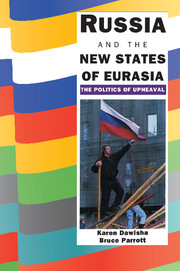Book contents
- Frontmatter
- Contents
- Preface
- Maps
- Introduction
- 1 The Legacies of History
- 2 National Identity and Ethnicity
- 3 The Impact of Religion
- 4 Political Culture and Civil Society
- 5 The Impact of Economics
- 6 Foreign Policy Priorities and Institutions
- 7 Military Issues
- 8 The Nuclear Factor
- Conclusion
- Appendix A Chronology of Events, January 1992 to October 1993
- Appendix B Compendium of Leadership and Institutional Changes in the Eurasian States, January 1992 to October 1993
- Appendix C Soviet Census Data, Union Republic and ASSR, 1989
- Notes
- Index
1 - The Legacies of History
Published online by Cambridge University Press: 06 July 2010
- Frontmatter
- Contents
- Preface
- Maps
- Introduction
- 1 The Legacies of History
- 2 National Identity and Ethnicity
- 3 The Impact of Religion
- 4 Political Culture and Civil Society
- 5 The Impact of Economics
- 6 Foreign Policy Priorities and Institutions
- 7 Military Issues
- 8 The Nuclear Factor
- Conclusion
- Appendix A Chronology of Events, January 1992 to October 1993
- Appendix B Compendium of Leadership and Institutional Changes in the Eurasian States, January 1992 to October 1993
- Appendix C Soviet Census Data, Union Republic and ASSR, 1989
- Notes
- Index
Summary
Although the destruction of the Soviet empire has created dramatic possibilities for the establishment of peaceful relations among the states of Eurasia, it has also unleashed long-suppressed national feelings and reopened age-old controversies. For this reason, historical scholarship must play an important role in efforts to understand the volcanic changes occurring in Eurasia. If it is true, as one practitioner has remarked, that the study of history can be defined as “the intersection of what was expected with what was not,” history can help analysts explain the geopolitical earthquakes of the past few years and help them envision the form of future eruptions. Any satisfactory analysis of these upheavals must situate the collapse and transformation of the USSR within a broader context that takes account of the complex legacies of the past.
History influences the behavior of states in at least two ways: as process and as memory. As a natural and social process, history creates physical and social realities that demand political action but also constrain leaders’ choices among potential responses. For example, history has created a geographical mingling of ethnic groups within the territory of the former USSR that demands decision-makers’ attention but diminishes the possibility of peacefully creating new states based on ethnically homogeneous populations. Similarly, historical processes have bequeathed most of the new states with high levels of economic interdependence that can be repudiated only at great cost. Such an inheritance limits the policies that leaders of the new states can adopt with any plausible hope of success. Objective conditions of this kind can sometimes be altered, but only through concerted action over the long term.
- Type
- Chapter
- Information
- Russia and the New States of EurasiaThe Politics of Upheaval, pp. 23 - 56Publisher: Cambridge University PressPrint publication year: 1994



